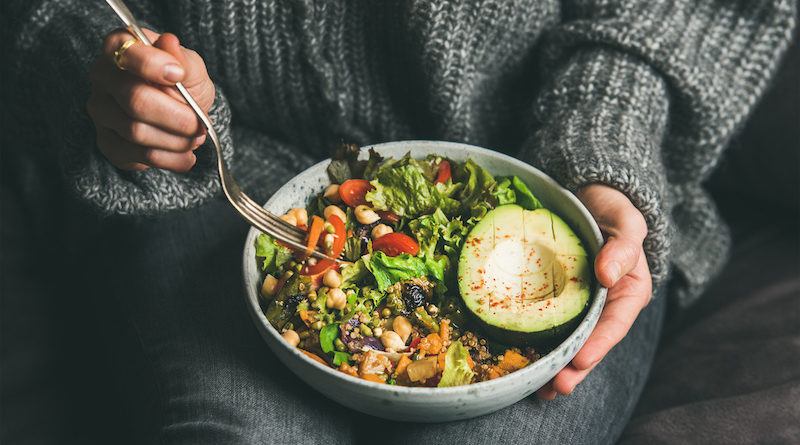Plant Powered
More and more elite athletes are switching to plant-based diets. Here’s why and what you should know.
Picture an elite athlete’s dinner plate. Go ahead, close your eyes and think about what you might see. Maybe some rice or pasta? Some kind of green vegetable? Perhaps, but most likely taking front and center stage in your mind is a big slab of meat.
Athletes need plenty of protein to build big, strong muscles so it only stands to reason that their plates should be piled high with meat or chicken paired with a tall glass of milk to wash it down, right?
I hate to burst your protein-packed milk bubble, but that couldn’t be further from the truth. In fact, a plant-based diet can be just as good, if not better, for athletic performance. Don’t believe me? Just ask the scores of professional athletes who attribute their ability to perform at high levels to a diet focused primarily on plants.
Tom Brady, Alex Morgan, Venus Williams and Scott Jurek are just the tip of the iceberg when it comes to elite athletes who adhere to a vegan or vegetarian diet. With those kinds of high-caliber athletes onboard you’re probably wondering, “Should I be a ‘veg-head’ too?”
Plant-Based or Vegetarian?
Before you take the plunge to eliminate meat from your diet, you should understand the various options and benefits. As the name implies, a plant-based diet is a diet made up of whole foods derived from plants, such as fruits, vegetables, grains, nuts, seeds, beans and legumes. You might be scratching your head thinking, “Isn’t that just a vegan diet?” Yes and no.
A plant-based diet is actually more restrictive than a vegan diet. Individuals who follow a vegan diet can eat any food that is not an animal or animal byproduct. That means more processed foods make the cut as part of a vegan diet. Those who adhere to a plant-based diet, on the other hand, avoid processed foods, refined grains, snack foods and sugar-sweetened beverages. That’s right; no more white bread, white rice, packaged meats, cookies, chips or soda. Vegetarians have even more foods at their disposal: Typically they avoid all meat, fish or poultry, but can still consume foods that come from animals such as dairy and eggs.
Regardless of which iteration it is, numerous studies have established that a diet devoid of animal products reduces risk of chronic conditions such as cancer and heart disease. In fact, vegetarians are 32 percent less likely to develop coronary artery disease than those who consume meat. As an athlete you might scoff at this fun fact because you assume that the miles you log make you all but immune to heart disease (in which case you might want to read our January 2019 article “Can You Eat What You Want?”).
Sadly, athletes are even more at risk for heart disease than non-athletes. One recent study found that endurance runners and cyclists had a higher percentage of coronary plaques than their by-and-large inactive peers.
As a marathoner myself, I was alarmed to learn that a study of men who had completed the Twin Cities Marathon at least 25 years in a row showed the men had higher coronary plaque volume than sedentary subjects. These findings make the potential heart-protective benefits of a meat-free diet all the more important for endurance athletes, even as the majority of us write off such concerns as a distant possibility.
That brings us to the question that might actually prompt us to consider changing to a diet consisting mainly of plant foods: If the health benefits of a plant-based, vegetarian or vegan diet are well established, can these diets potentially aid in our athletic performance as well?
Health Benefits?
As is the case with any diet, it is nearly impossible to establish a direct cause-and-effect relationship between our food choices and how well we run, bike, swim, hike, throw or even do a downward dog. Still, we can make logical inferences based on what we have established through research. And all signs point to going meatless being a boon to athletes in nearly every sport. Let’s break down how and why we can power our bodies and improve recovery with plants.
First up, let’s take what we do know: Plant-based, vegetarian or vegan diets have all been shown to reduce atherosclerosis.
Atherosclerosis—a disease caused by plaque deposition in the arteries—can reduce blood flow, thereby reducing how fast important nutrients like oxygen and glucose can be delivered to working muscles and how fast waste products like carbon dioxide and lactate can be cleared. The potential performance implication: A diet that decreases risk for atherosclerosis can also promote more rapid delivery of nutrients and removal of metabolic wastes during exercise and thereby enhance speed, stamina and recovery time.
We also know that exercising muscles produce what are known as free radicals. When exercising for long periods of time or at high intensities, the production of these free radicals can surpass our body’s ability to neutralize them, resulting in oxidative damage. Oxidative damage to our muscles can cause fatigue, increased recovery time and even injury. Antioxidants work to combat this stress by neutralizing free radicals. Plenty of research has also shown that a diet high in antioxidants cuts down on recovery time and reduces risk of injury in athletes. Where do we get our antioxidants? You guessed it, plant foods. Fruits, vegetables and whole grains are teeming with antioxidants that promote recovery and prevent muscle fatigue.
Another known entity is the impact a plant-based diet has on inflammation. Numerous studies have found that a vegetarian diet reduces levels of C-reactive protein, a marker of inflammation that can be tested in the blood. Any athlete who has pushed their muscles to the limit is all too familiar with the soreness—caused by inflammation—that follows in the day or two after strenuous exercise. It can be deduced that a vegetarian diet could benefit athletes by easing muscular inflammation and pain.
Before you purge your kitchen of all traces of animal products, it is important to clear up one major misconception: becoming a vegetarian or vegan doesn’t automatically make you healthier or a better athlete. Highly processed foods ranging from Oreos to French fries are fair game as part of a vegan or vegetarian diet. I try to find the good in everything, but even I would be hard-pressed to find any redeeming health qualities from either. Switching to a plant-based diet or even just cutting down on animal products requires planning and smart choices to reap the potential health and performance benefits. In other words, focusing less on the foods that you aren’t eating and more on the foods that you are becomes critical to ensuring you’re meeting your dietary needs.
The Protein Problem
The number one trepidation most individuals have about forgoing animal products is protein, and I am fairly confident that at some point every vegetarian has been asked, “If you don’t eat meat then how do you get enough protein?” Protein is certainly an important nutrient, especially for athletes, because it is essential for muscle growth and repair. The recommendation for the average person is 0.8 grams per kilogram of body weight per day, however this recommendation can increase to as much as 1.2 to 1.7 grams per kilogram of body weight for those exercising for long durations and/or at high intensities. That means an adult weighing 150 pounds would need 82 to 116 grams of protein per day.
Consuming adequate protein can become even more challenging for plant-based athletes.
In general, the proteins in plant sources has lower bioavailability than those found in meat. This means they are lacking in one or more essential amino acids, the building blocks of protein. It was previously thought that in order to get adequate amounts of protein from a plant-based diet, individuals had to pair different foods together (like rice and beans). Fortunately, further research has found that as long as a variety of foods are eaten throughout the day, protein needs can be met.
Still, to account for the low bioavailability and lower digestibility of plant proteins, it is recommended that vegetarians consume 10 percent more protein. That means that same 150-pound athlete would need to consume 90 to 128 grams of protein per day.
If that seems daunting, fear not! There are many sources of plant-based protein, including beans, legumes, soy, whole grains, nuts and seeds.
Ultimately, there is no one diet that is right for all athletes. If you choose to follow a plant-based diet for health, performance, ethical or environmental reasons it is important you are aware of your individual needs and take a planned approach.
Consider meeting with a registered dietitian to check in on the adequacy of your current diet or to help you make the transition to a body powered by plants.
Jamie Sheahan is the Director of Nutrition at The Edge in South Burlington. She holds a Master of Science in Dietetics from the University of Vermont, where she serves as an adjunct professor of sports nutrition. Jamie has run over 40 marathons in addition to several ultra marathons.



